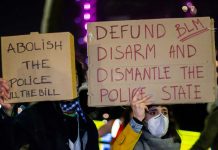
When a sitting governor is booed not once, not twice, but four separate times by thousands of fans at a world-class sporting event, the story isn’t just about politics—it’s about the raw pulse of public sentiment refusing to be ignored.
Story Snapshot
- Kathy Hochul faced repeated, intense booing at the Ryder Cup opening ceremony at Bethpage Black.
- The crowd’s reaction became a flashpoint for political commentary, especially among rivals.
- Social media amplified the incident, fueling debate on leadership and polarization.
- Anticipation builds for how other political figures will be received at the same event.
Repeated Booing at Ryder Cup Signals Deep Discontent
September 24, 2025, will be remembered not for a golf swing, but for a chorus of boos echoing across Bethpage Black as Governor Kathy Hochul took the stage. Introduced by Carson Daly, Hochul received a reception that was both immediate and relentless. The jeers didn’t fade after her name was announced—they intensified each time it was mentioned, even when she was no longer visible. Political figures have been booed at public events before, but rarely with such frequency and venom.
Hochul’s swift exit from the stage only stoked the crowd’s fervor. On social media, the spectacle became instant fodder for rivals. Rep. Elise Stefanik, never one to miss a moment, mocked Hochul with a pointed message: “Brutal boos for Kathy Hochul at Bethpage at Ryder Cup 2025. Bad day for the worst governor in America!” Reports from Outkick, Fox News, and The Spun confirm the crowd’s repeated hostility, painting a picture of a governor struggling to connect with her constituents at one of the state’s marquee events.
Political Polarization Hits the Fairway
Political divisions in New York are nothing new, but the Ryder Cup incident marks a public crescendo. Hochul’s tenure has been defined by controversy—crime, housing, taxes—and her approval ratings have suffered. The Ryder Cup’s enthusiastic audience, many of whom hold strong opinions on state politics, seized the moment to voice their grievances. This wasn’t an isolated outburst but a reflection of broader dissatisfaction that has been brewing for months.
The presence of other high-profile political figures loomed large. With former President Donald Trump scheduled to attend later in the week, speculation swirled about whether he would receive a hero’s welcome or suffer a similar fate. The politicization of sporting events, once considered a rarity, now seems to be the new normal. Event organizers, hoping for a focus on golf, instead navigated a minefield of public sentiment and media scrutiny.
Media Amplification and Social Media Firestorm
Within hours, news outlets and social media platforms transformed the booing into a national conversation. Videos circulated, headlines blared, and commentary intensified. Stefanik’s tweet was just the beginning; hundreds of Twitter accounts chimed in, either piling on or defending Hochul’s right to attend as the state’s top official. The incident became a litmus test for the health of American discourse—are we witnessing justified protest or a breakdown of civil engagement?
The Ryder Cup itself became secondary to the spectacle. Golfers, commentators, and organizers were forced to address the elephant in the room. Carson Daly attempted humor to diffuse tension, but the story had taken on a life of its own. As Trump’s visit approached, anticipation mounted: would the crowd’s reception flip, revealing the stark lines of political allegiance, or would the event maintain its sporting focus? The answers would come, but not without further drama.
Long-Term Implications for Political and Sporting Worlds
For Hochul, the short-term impact is clear: negative headlines, amplified opposition, and a distraction from policy and governance. For her rivals, the incident is a rallying cry, proof that discontent runs deep and is ready to erupt in public spaces. The Ryder Cup organizers, meanwhile, may reconsider future invitations to political figures, wary of turning world-class events into battlegrounds.
The long-term consequences reach beyond one governor or one tournament. As sports and politics grow increasingly intertwined, leaders must decide whether the risk of public backlash outweighs the visibility such events offer. Fans, emboldened by social media, now hold the power to shape the narrative in real time. The precedent set at Bethpage Black may signal a new era where public figures face raw, unfiltered feedback not in polls, but in the unforgiving glare of the crowd.
Sources:
Outkick: Golf Fans Loudly Booed NY Gov. Kathy Hochul at Ryder Cup
Fox News: Hochul Hears Loud Boos from Ryder Cup Fans at Bethpage Black
The Spun: U.S. Governor Booed Repeatedly While Attending Ryder Cup
New York Post: Kathy Hochul Viciously Booed at Ryder Cup Opening Ceremony on Long Island









